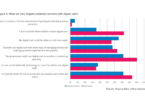On Monday, Denis Beau, First Deputy Governor of the Banque de France, discussed the risks and opportunities brought by the digitalization of finance and the potential for a central bank digital currency (CBDC).
There is much to look forward to with the digitalization of finance. Financial inclusion, greater payments efficiency and the smoother transmission of monetary policy to the economy are creating opportunities within the financial system.
Though Beau lauded these opportunities in his speech, he also expressed concern that digitalization is creating significant competition for central banks from alternative payment systems. The retail payment space is seeing huge growth from new players such as Big Tech firms with considerable financial resources and worldwide networks.
“A major [risk of digitalization] is to jeopardize the central role, as anchor and stabilizer, of the national central bank currency of a country’s financial and monetary system,” said Beau.
After discussing the drawbacks of digitalization, Beau used the majority of his speech to set out possible policy responses and the role of a CBDC.
The first logical response for central banks would be to draw up an adequate regulatory framework. At the international level, the main concern is ensuring that all countries adopt strict enough regulations to deal with challenges raised by stablecoins.
Beau also stressed that central banks had a major role in supporting private initiatives that could strengthen Europe’s sovereignty in payments, namely the European Payments Initiative (EPI).
Thirdly, and arguably most crucially, banks can better prepare to respond to digitalization by developing a central bank digital currency (CBDC). “This response would help reassert the anchoring role of central bank money in both the retail and wholesale settlement and payment space,” said Beau.
The main takeaway from Beau was the heightened responsibility of central banks to fulfill their financial stability mandate. To do this, “the readiness to issue a CBDC can prove an important lever to that end.”
Meanwhile, last month, the Banque de France took the latest step in testing the digital euro in one of the broadest wholesale CBDC trials in the world. Using JP Morgan’s Onyx blockchain unit, the Banque de France was involved in a CBDC cross-border payment experiment with the Monetary Authority of Singapore. This followed another experiment with the Swiss National Bank. The French central bank is involved in tests with eight different partners, most of which created consortia.






